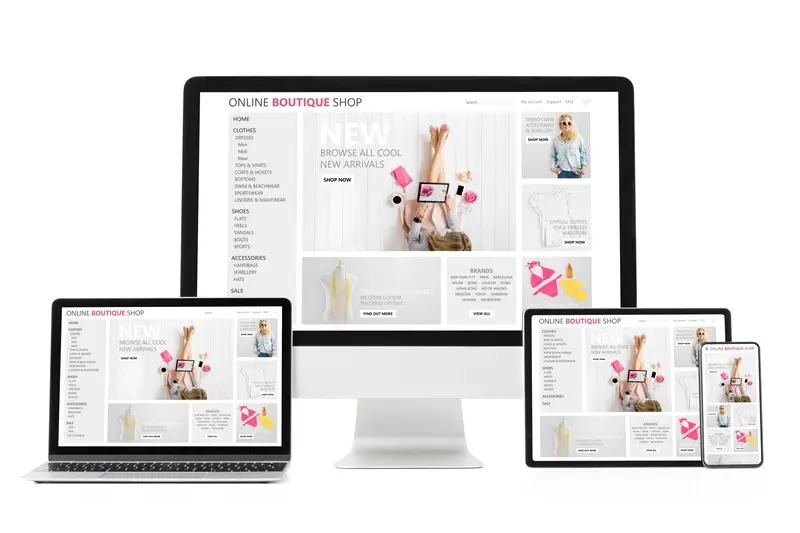What Is Enterprise Mobile App Development?
In today's fast-paced business world, enterprise mobile apps have become as essential as having a morning cuppa before starting your workday. Whether you're a business leader exploring mobile solutions or an IT manager tasked with modernising your company's digital toolkit, understanding enterprise mobile app development is crucial for staying competitive.
Think about how you use your mobile phone throughout the day – checking emails, managing tasks, or accessing important documents. Now imagine having all your complex business processes streamlined in the same way. That's exactly what enterprise mobile apps aim to achieve, but on a much grander scale.
Enterprise mobile development isn't just about creating an app; it's about transforming how organisations operate in the digital age
Why This Guide Matters
With over eight years of witnessing the evolution of enterprise mobile solutions, we've seen firsthand how proper understanding can make the difference between a game-changing app and an expensive mistake. This comprehensive guide will walk you through everything you need to know about enterprise mobile app development, from initial planning to successful deployment.
We'll be sharing practical insights and best practices, helping you navigate common challenges like security concerns, system integration, and user adoption. Whether you're looking to develop your first enterprise app or improve an existing one, you'll find valuable information in each chapter to guide your decision-making process.
Remember, enterprise mobile app development isn't just about technical specifications – it's about creating solutions that make your employees' lives easier and your business more efficient. Let's embark on this journey together.
Understanding Enterprise Mobile Apps
When you hear the term "enterprise mobile app," you might picture a complex, corporate beast that's quite different from the social media apps we use every day. And you'd be right! Think of enterprise apps as purpose-built digital tools that help large organisations run more smoothly - like a Swiss Army knife designed specifically for your business needs.
What Makes Enterprise Apps Different?
Unlike consumer apps that might help you order takeaway or chat with friends, enterprise mobile apps are built to handle serious business processes. Imagine a massive retailer using a custom app to manage their inventory across hundreds of stores, or a healthcare provider using an app to securely access patient records on the go. These apps need to be robust enough to handle thousands of users simultaneously while maintaining top-notch security.
The Core Purpose
At their heart, enterprise mobile apps serve as bridges between your workforce and your business systems. They're designed to boost productivity, streamline workflows, and make life easier for everyone in your organisation. Remember that clunky old system where you had to be at your desk to approve expenses? Modern enterprise apps let you do that with a few taps on your phone whilst waiting for your morning coffee.
What's particularly fascinating is how these apps have evolved over the past few years. We've seen them transform from basic data-entry tools to sophisticated platforms that can handle everything from AI-powered analytics to augmented reality training modules. They're no longer just mobile versions of desktop software - they're powerful tools that can fundamentally change how your business operates.
Key Features and Requirements
When it comes to enterprise mobile apps, the features and requirements can feel overwhelming at first. After working with numerous enterprise clients over the years, we've learned that successful apps share certain essential characteristics that set them apart from consumer applications.
Core Enterprise Features
Enterprise apps need to be robust workhorses that can handle complex business processes whilst remaining user-friendly - rather like having a skilled personal assistant in your pocket. Think about how the NHS manages patient records or how Tesco coordinates its massive supply chain; these are perfect examples of enterprise apps in action.
- Scalable architecture to handle thousands of simultaneous users
- Role-based access control and user management
- Offline functionality for field operations
- Real-time data synchronisation
- Analytics and reporting capabilities
- Multi-platform compatibility
Business Requirements
Beyond technical features, enterprise apps must align with specific business requirements. These requirements often stem from regulatory compliance, industry standards, and internal policies. Just as a Swiss watch needs precise engineering to keep perfect time, enterprise apps require meticulous attention to detail in meeting these requirements.
Always document your enterprise app requirements in detail before development begins. We've found that spending an extra week in the planning phase can save months of revisions later!
Remember, while consumer apps might prioritise engagement and entertainment, enterprise apps must focus on efficiency, security, and reliability. It's rather like the difference between a sports car and a delivery lorry - both are vehicles, but they serve very different purposes.
Planning Your Enterprise App
Planning an enterprise mobile app can feel like trying to solve a Rubik's cube blindfolded - there are so many moving parts to consider! But don't worry, we'll help you break this down into manageable pieces.
Understanding Your Users and Goals
Before diving into technical specifications, it's crucial to understand who will use your app and what they need to achieve. We've found that spending time with actual end-users - whether they're warehouse staff scanning inventory or sales teams accessing customer data on the go - provides invaluable insights that shape the entire development process.
Creating Your Roadmap
Think of your app planning phase like preparing for a round-the-world trip. You'll need to map out key milestones, identify potential obstacles, and ensure you have the right resources for the journey. This includes defining your minimum viable product (MVP), establishing clear success metrics, and creating a realistic timeline that accounts for testing and feedback loops.
In our experience working with organisations across various sectors, the most successful enterprise apps start with a thorough planning phase that considers both immediate needs and future scalability. It's rather like building a house - you need solid foundations before you can start thinking about extensions.
Remember to involve all stakeholders early in the planning process. From IT teams worried about security to finance departments concerned about ROI, everyone's input matters. We've seen countless projects succeed simply because they took the time to get buy-in from all departments before writing a single line of code.
Choosing the Right Tech Stack
Selecting the perfect technology stack for your enterprise mobile app can feel like trying to solve a particularly tricky puzzle. With countless options available, it's natural to feel a bit overwhelmed. We've guided numerous organisations through this process, and we understand that making the right choice is crucial for your app's success.
The foundation of any successful enterprise mobile app lies not in choosing the trendiest technologies, but in selecting the ones that best align with your business objectives and user needs
Native vs Cross-Platform Development
Let's break this down into digestible bits. Your first major decision will likely be between native development (iOS and Android separately) or cross-platform solutions. Native development typically offers better performance and access to platform-specific features - rather like having a bespoke suit rather than one off the peg. However, cross-platform frameworks like Flutter or React Native can significantly reduce development time and costs, whilst still delivering excellent results.
Backend and Infrastructure Considerations
The backend is where the real magic happens. Think of it as your app's engine room. You'll need to consider factors like scalability, existing infrastructure, and integration requirements. Cloud services from providers like AWS or Azure often prove invaluable for enterprise apps, offering robust security and scalability. Remember how the BBC iPlayer evolved from a simple streaming service to a complex, personalised platform? That's the kind of scalability your tech stack should support.
The key is to choose technologies that not only meet your current needs but can also grow with your business. It's about finding the sweet spot between functionality, performance, and maintainability.
Security and Compliance Essentials
When it comes to enterprise mobile apps, security isn't just a checkbox—it's the foundation of trust between your business and its stakeholders. Think of it like building a house; you wouldn't skimp on the locks and alarm system if you were storing valuable items inside, would you?
Essential Security Measures
From our experience working with enterprise clients, we've learned that robust security starts with the basics: end-to-end encryption (imagine your data wearing an invisibility cloak), secure authentication (like having a sophisticated bouncer at your app's entrance), and regular security updates (similar to how you'd update your home's security system). These elements work together to create a fortress around your sensitive business data.
Compliance: More Than Just Red Tape
We understand that navigating compliance requirements can feel like trying to solve a Rubik's cube blindfolded. Whether it's GDPR in Europe, HIPAA for healthcare apps, or industry-specific regulations, compliance isn't just about avoiding fines—it's about protecting your users and maintaining their trust. Remember when Facebook faced massive backlash over data privacy issues? That's precisely what proper compliance helps prevent.
In our eight years of developing enterprise apps, we've found that the most successful approaches integrate security and compliance from day one. It's rather like baking a cake—you can't add the flour after it's done! By considering these elements during the initial planning stages, you create a more robust, trustworthy application that your users will feel confident using. After all, in today's digital world, trust is the currency that matters most.
Integration with Business Systems
When it comes to enterprise mobile apps, they rarely exist in isolation. Think of them as team players in your broader business ecosystem – they need to work harmoniously with your existing systems to truly deliver value.
Understanding Integration Points
Whether you're managing inventory, processing sales data, or handling customer information, your enterprise app needs to communicate effectively with various business systems. It's rather like ensuring all musicians in an orchestra are playing from the same sheet music – everything needs to be perfectly synchronised.
From our experience working with various enterprises, we've noticed that successful integration often comes down to carefully mapping out your data flows and understanding exactly how information needs to move between systems. This might include your ERP system, CRM platform, HR software, or legacy databases.
Common Integration Methods
There are several ways to achieve smooth integration, and choosing the right approach can make all the difference to your app's performance and reliability. Think of it as choosing the right tool for the job – you wouldn't use a hammer to paint a wall, would you?
- API Integration: RESTful or SOAP APIs
- Middleware Solutions: Enterprise Service Bus (ESB)
- Direct Database Integration
- Cloud-Based Integration Platforms
- Custom Integration Solutions
Always start with a comprehensive audit of your existing systems before planning integrations. It's much easier to map the journey when you know exactly where you're starting from!
Testing and Quality Assurance
When it comes to enterprise mobile apps, thorough testing isn't just a box-ticking exercise - it's absolutely crucial for success. We understand that your enterprise app will be handling sensitive data and critical business operations, so there's naturally some anxiety about getting it right.
The Testing Journey
Think of testing as giving your app a comprehensive health check-up. Just as you wouldn't want to discover a medical issue too late, catching potential problems early in your enterprise app can save tremendous headaches down the road. From our experience working with countless enterprises, we've learned that a systematic approach works best.
- Functional Testing - Ensuring every feature works as intended
- Performance Testing - Checking app speed and resource usage
- Security Testing - Identifying vulnerabilities and weak points
- Integration Testing - Verifying smooth interaction with other systems
- User Acceptance Testing - Real-world testing with actual users
- Cross-platform Testing - Ensuring consistency across different devices
Quality Assurance Best Practices
Quality assurance isn't just about finding bugs - it's about preventing them in the first place. Remember the old carpenter's saying, "measure twice, cut once"? The same principle applies here. We recommend implementing continuous testing throughout development, rather than leaving it all to the end. This approach, while sometimes feeling slower initially, actually speeds up the overall development process and results in a more robust final product.
Regular feedback loops between testers, developers, and end-users help create an app that not only works flawlessly but truly serves its intended purpose. After all, what good is a technically perfect app if it doesn't meet your users' needs?
Deployment and Maintenance
After months of careful development, you're finally ready to launch your enterprise mobile app. It's an exciting moment, but it can also feel a bit like preparing to send your child off to university - you want to make sure everything's perfectly in place for a smooth transition.
Deployment Strategy
Enterprise app deployment isn't as simple as pushing your app to public app stores. You'll need to consider whether to use private app stores, mobile device management (MDM) systems, or over-the-air distribution methods. Think of it as choosing the right delivery service for a precious package - each method has its own benefits and security considerations.
Successful enterprise app deployment isn't a destination - it's an ongoing journey of updates, improvements, and adaptations to evolving business needs
Ongoing Maintenance
Once your app is live, the real work begins. Just as a garden needs regular tending, your enterprise app requires consistent care and attention. This includes monitoring performance metrics, gathering user feedback, and planning regular updates. We've seen countless times how proactive maintenance can prevent small issues from becoming major headaches.
Regular maintenance tasks typically include updating security protocols (remember the WannaCry incident?), optimising performance, fixing bugs, and adding new features based on user feedback. It's also crucial to keep your app compatible with the latest operating systems and device updates - nothing frustrates users more than an app that suddenly stops working after their phone updates!
Remember to establish a clear maintenance schedule and set aside resources for both planned updates and unexpected issues. After all, your enterprise app is a living, breathing part of your business infrastructure that needs constant nurturing to thrive.
Conclusion
Building an enterprise mobile app is quite a journey, isn't it? Like putting together a complex puzzle, every piece needs to fit perfectly to create something truly valuable for your organisation. We've walked through everything from understanding what makes enterprise apps special to ensuring they're secure and well-maintained.
Remember when mobile phones were just for calls and texts? Today, they're powerful tools that can transform how your entire business operates. Whether you're looking to streamline operations, boost employee productivity, or create better customer experiences, a well-designed enterprise app can make all the difference.
The key takeaway is that successful enterprise mobile app development isn't just about coding – it's about understanding your business needs, choosing the right technology, ensuring security, and planning for the long term. Think of it as building a house; you need solid foundations, quality materials, and regular maintenance to ensure it serves you well for years to come.
As mobile technology continues to evolve at a rapid pace, staying informed about best practices and emerging trends will be crucial. While the journey might seem daunting, remember that you're not alone. Whether you choose to develop in-house or partner with experts, focus on creating an app that truly serves your organisation's needs whilst keeping security and user experience at the forefront.
The future of enterprise mobility is incredibly exciting, and with careful planning and execution, your enterprise mobile app can become a powerful asset in your digital transformation journey. Here's to taking that first step towards mobile excellence!
Share this
Subscribe To Our Learning Centre
You May Also Like
These Related Guides

What Are the Essential Integrations Every Startup App Should Consider?

What Is Cross-Platform App Development and Is It Right for Me?



